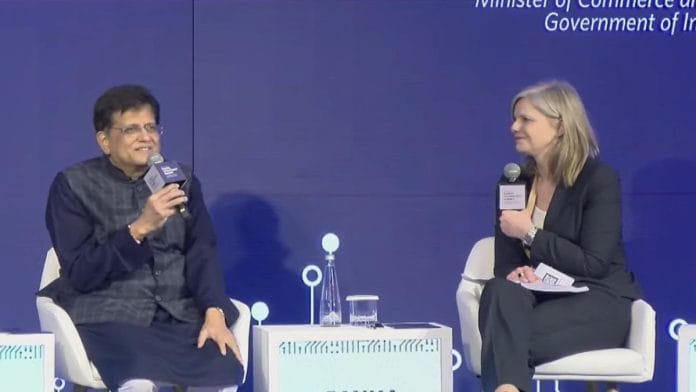New Delhi: Piyush Goyal Friday said that the US global tariffs were a “great opportunity” for India to reset its trade ties, particularly with America, while highlighting that the current crisis was due to the World Trade Organisation’s Most Favoured Nation (MFN) status going to China in the late 1980s and 1990s, with a hope that Beijing could “behave better”. He added that India did not want foreign direct investments (FDI) from China.
Commerce and Industry Minister Goyal made these statements at the Global Technology Summit 2025, organised by Carnegie India and the Ministry of External Affairs.
On Trump’s tariffs, Piyush Goyal said: “Undoubtedly, it is a great opportunity for India to reset its trading relations, particularly with the US. India today is an economy growing at the fastest pace among the large economies in the world … I think there is a huge opportunity for India to bring in investment, expand our trading relationships, and along with that, look at services and integrate our economy with the developed world.”
On 2 April this year, US President Donald J. Trump announced a baseline imposition of new tariffs of 10 percent on every country in the world and additional tariffs on over 60 countries based on their trade deficits with America. The US slapped 27 percent additional tariffs on India and far higher tariffs on countries such as China. However, it paused the additional tariffs for 90 days, except for those imposed on China, with Trump, in his latest move, increasing its total tariffs to 125 percent.
Goyal said that the reciprocal tariffs were an opportunity to improve India’s tariff protections for countries engaging in “unfair trade practices”. “We really will be in a position now to set up [trade] bilaterally with many countries … [form] better trading relationships that will also spur greater investment in India,” he highlighted.
The minister also said that currently, there was hardly any foreign direct investment in India from China’s end and not much Chinese investment has come to India over the years. “Nor are we encouraging any significant investment … At the moment, that is the policy,” he added.
According to Goyal, the “genesis” of the current global trading crisis is an outcome of the practices of Western countries in the late 1980s and 1990s—when China was “accepted” into the WTO.
“MFN benefits were given to China by all countries in the world, collectively, with the desire and hope we could trust them to behave better. Sadly, that never happened. Over the years, country after country, industrial sector after sector has realised how their practices have hurt businesses and economies,” said Goyal.
The MFN principle of the WTO requires members to treat each other equally.
The current actions against China by the West “vindicates” India’s position of not joining the Regional Comprehensive Economic Partnership (RCEP) in 2019, considering that the partnership did not honour the free trade principles.
RCEP, a 15-member free trade pact, includes China, 10 ASEAN (Association of Southeast Asian Nations) member-states, Japan, South Korea, Australia and New Zealand. The pact creates one of the largest free-trade areas in the Asia-Pacific.
Goyal called the Trump tariffs “a necessity” and “great for the world”.
‘EU needs to rethink climate protection for FTA’
Goyal was all-praise for the new European Union (EU) College of Commissioners, including Trade Commissioner Maros Sefcovic. However, he added a word of warning—rethink climate protection laws.
The minister took exceptions to the Carbon Border Adjustment Mechanism (CBAM) and the deforestation rules as “irrational standards”, which, he said, had harmed the conclusion of negotiations for free trade agreements in the past.
CBAM is a border tax to be imposed on seven energy-intensive sectors, including steel, cement, fertilisers, and engineering goods, starting next year, 2026.
At the summit, Goyal said, “My sense is we can complete most discussions—quite amicably. In two areas, the EU will have to do a rethink. One is the non-trade issues, which they seek to superimpose into the trade agenda … Any self-respecting, decent country cannot sign up on commitments, which are irrational and beyond the realm of trade.”
He added: “Secondly, Europe today is in a crisis—in my humble opinion—because of the severity of the non-tariff barriers that Europe has created. Unless Europe recognises its path is taking it downhill, I see serious difficulties for Europe in trade with any country, especially India.”
By Europe, he was referring to the EU. The CBAM, launched in 2022, has been an irritant in completing trade negotiations. However, during the EU College of Commissioners’ visit to India in February this year, the parties agreed to complete the FTA negotiations—ideally by 2025-end. Automobiles, liquor and spirits, and agricultural products are important areas for the EU, with the organisation wanting India to reduce the tariffs in these sectors.
(Edited by Madhurita Goswami)






